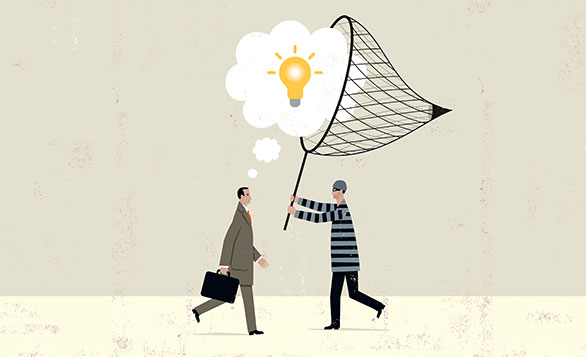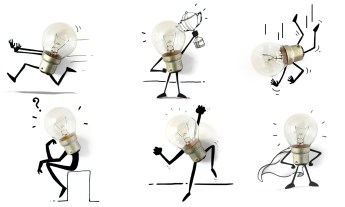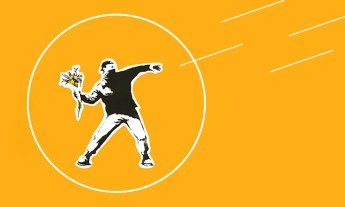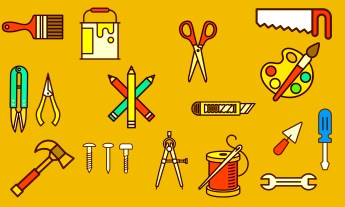
Writer Seth Godin explains why it’s absolutely fine if you steal his ideas … you have to promise to make them better.
Please don’t steal my car.
If you drive away with it, I won’t have it any more, which is a real hassle.
Please don’t steal my identity or my reputation either. Neither travels well, and all the time you’re using it, you’re degrading something that belongs to me.
But my ideas? Sure, yes, please, by all means, take them.
The scarcity underlying the industrial economy (what’s not yours is mine) has pushed us to make a mistake about ideas. If everyone in town comes to my plant and takes a free sample of what I make, I’ll go bankrupt. But if everyone in the world takes a free sample of one of my ideas (or at least one of my good ones), we’ll all get richer.
I got an email from a reader last week. She was spitting angry at another blogger and wanted me to lower the hammer on him. According to my loyal reader, he had plagiarized many of my ideas, writing one post after another that, while not using my words, clearly demonstrated to her that he was hunting on my land.
Not true, I assured her. He hadn’t plagiarized anything, he had built something new, by synthesizing ideas and experiences to invent the next step, a step available to all of us.
It’s not my land. It’s ours. And no one is hunting… If anything, we’re farming, and all the cross-pollination going on helps everyone.
How dare we criticize an inventor or an author or a leader for, “stealing someone else’s ideas.” Ideas can’t be stolen, because ideas don’t get smaller when they’re shared, they get bigger.
It’s not my land. It’s ours. And no one is hunting… If anything, we’re farming, and all the cross-pollination going on helps everyone.
That’s one reason why the rise of patent trolling among otherwise upstanding innovators is so troubling. The patent troll uses the specter of long, drawn-out litigation to extort money from completely innocent entrepreneurs. The patent troll is selfish, spinning out untruths for personal profit — he belongs under a bridge somewhere, not on stage or on our bookshelf. The chilling effect of this mistaken understanding of the moral and legal implications of idea theft is huge.
What patent trolls won’t talk about, because they have no standing and no proof, is the fact that an expensive, bureaucratic patent system does nothing at all to increase the likelihood that new ideas will be created and most important, that new productivity will arise. Patents weren’t developed to protect ideas (ideas can’t be patented) but the specific execution of useful innovations.
Trolls and their copyright-defending brethren would like to amplify a cultural shift, one that’s left over from the days of Henry Ford and Frank Sinatra. They’d like people to be afraid to steal ideas. We don’t need to shun those that steal ideas. We need to chastise those that think that this is a problem.
Matt Ridley has famously pointed out that no one knows how to make a computer mouse. You need the assembled talents of a metallurgist, a plastics specialist, someone in supply chain management, a software whiz, etc. The productivity of our generation isn’t the productivity of the efficient assembly line (that’s old school). No, our productivity is the productivity of connection.
The connection economy steps in just as the glory days of the industrial age begin to fade. The connection economy rewards coordination, sharing and trust. All three of which are built on our species’ unique ability to steal ideas.
The connection economy steps in just as the glory days of the industrial age begin to fade.
When two people meet on the dance floor, an exchange of ideas takes place. My move, your move. When two people play chess, they each get a little smarter. And when a chef joins another in the kitchen, the unspoken exchange of ideas moves the state of the art forward.
Is it theft to put raw fish on seasoned rice? What about serving a pizza grilled on coals without crediting Al Forno in Rhode Island? At what point can we stop calling it stealing and start calling it merely delicious?
There is, of course, a difference between stealing and passing off. When you pretend that those taken words are your words, you’re no longer taking an idea — you’re taking an implementation. When you pretend that you are the originator, the original source, and you’re not, you’ve corrupted your work by claiming authorship, when you are merely contributing synthesis. This hurts your reputation as well as the person you stole from, because our society values authorship and origination.
The amazing thing about giving credit, though, is you never run out. Like ideas, the more credit is shared, the more it can be worth, to the giver and to the recipient.
Last thing: With the ability to steal comes responsibility. Not just the responsibility to synthesize something better than what you started with, but the obligation to relentlessly seek out the next thing worth stealing. We’ve created a bucket line. Our economy is a long line of people handing ideas up and down the line, improving and customizing at each step. When you stop seeking and merely consume, you let us all down.
And yes, sure, please steal this idea. But make it better first, okay?
Seth Godin is a relentless blogger, a teacher and an entrepreneur. “Questions Worth Asking” is a TED editorial series; this week we asked the question, “Can I borrow that?” to dig into themes of cross-disciplinary innovation and idea-sharing. See also a story about SkyBox Imaging, a company using unexpected technology to build a new type of satellite, and an interview with Suzanne Lee, who’s mixing science, fashion and kombucha to extraordinary effect.



















